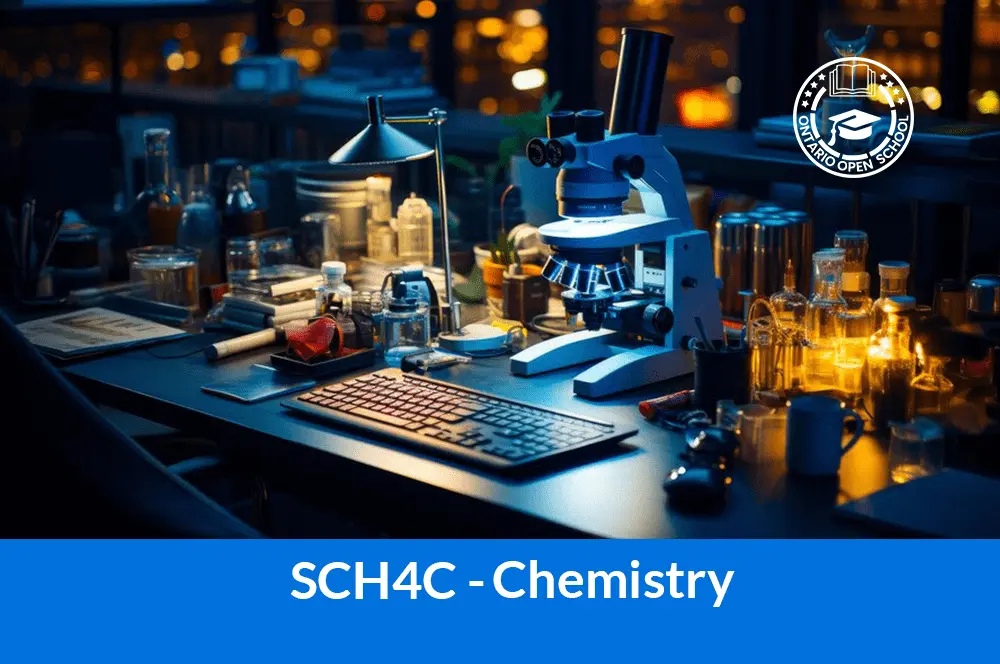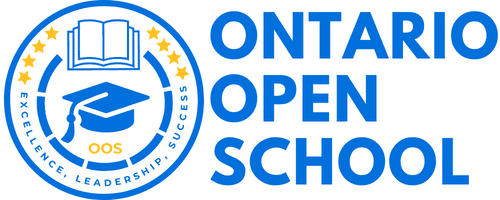- info@ontarioopenschool.com
- 647-494-4499
-
Unit 100 - 29 Gervais Drive, North York, ON.
M3C 1Y9
Copyright 2024 Ontario Open School Inc. All Rights Reserved.
This course enables students to develop an understanding of chemistry through the study of matter and qualitative analysis, organic chemistry, electrochemistry, chemical calculations, and chemistry as it relates to the quality of the environment. Students will use a variety of laboratory techniques, develop skills in data collection and scientific analysis, and communicate scientific information using appropriate terminology. Emphasis will be placed on the role of chemistry in daily life and the effects of technological applications and processes on society and the environment.
Unit Order | Unit Name | Suggested Time |
|---|---|---|
| Unit 1 | Matter and Qualitative Analysis
| 22 hours |
| Unit 2 | Chemical Calculations
| 24 hours |
| Unit 3 | Organic Chemistry
| 22 hours |
| Unit 4 | Chemistry in the Environment
| 15 hours |
| Unit 5 | Electrochemistry
| 19 hours |
| Final Evaluation 30% | Final Project Final Exam | 6 hours 2 hours |
| Total | 110 hours |
A wide variety of instructional strategies are used to provide learning opportunities to accommodate a variety of learning styles, interests and ability levels. These strategies include, but are not limited to:
| Oral Presentation | Activity Learning Centers | Brainstorming |
| Discussion | Think Pair Share | Lecture |
| Socratic Lesson | Visual Stimuli | Worksheet |
| Independent Study | Note Making | Inquiry Process |
| Research Process | Scientific Method | |
| Computer Assisted Instruction | Media Presentation |
Assessment & Resources
Purpose
The primary purpose of assessment is to improve student learning. Assessment relates directly to the expectations for the course.
A variety of assessments for and as learning are conducted on a regular basis to allow ample opportunities for students to improve and ultimately demonstrate their full range of learning and for the teacher to gather information to provide feedback. Assessment tasks relate to the success criteria set out in lesson plans. Success criteria allow students to see what quality looks like.
Evaluation is the process of judging the quality of student work in relation to the achievement chart categories and criteria and assigning a percentage grade to represent that quality. Evaluation is based on gathering evidence of student achievement through:
Assessment for Learning – we provide feedback and coaching. Assessment FOR Learning is the process of seeking and interpreting evidence for the use of learners and their teachers to decide where the learners are in their learning, where they need to go, and how best to go there.
Assessment as Learning – we help students monitor progress, set goals, reflect on their learning
Assessment AS Learning is the process of the explicit fostering of students’ capacity over time to be their own best assessors, but teachers need to start by presenting and modeling external, structured opportunities for students to assess themselves.
Assessment of Learning – we use assessments to provide evaluative statements about student achievement. Assessment OF Learning is the assessment that becomes public and results in statements of symbols
(marks/grades/levels of achievement) about how well students are learning. It often contributes to pivotal decisions that will affect students’ future.
ASSESSMENT TOOLS
| Units | Duration | Overall Expectations | AFL | AAL | AOL | K
25% |
A
25% |
C
25% |
T 25% |
||
| A | A1-A2 | Student-Teacher Conferencing | Peer Assessment | Poster Presentation | √ | √ | √ | √ | |||
|
70% |
B | 22 | B1-B3 | Worksheet
Class Discussion |
KWL Chart | Unit Test
Class Discussion |
√ | √ | √ | √ | |
| C | 19 | C1-C3 | Worksheet
Pair Discussion |
Learning Log |
Unit Test Written Assignment |
√ | √ | √ | √ | ||
| D | 30 | D1-D3 | Homework
Student – Teacher Conferencing |
Reflective Discussion |
Unit Test Portfolio Assignment |
√ | √ | √ | √ | ||
| E | 19 | E1-E3 | Oral Presentation
Diagnostic Quiz |
Student- Teacher Conferencing | Unit Test
Individual Presentation |
√ | √ | √ | √ | ||
| F | 20 | F1-F3 | Q/A Session | Peer Assessment | Unit Test
Collaborative Collage Assignment |
√ | √ | √ | √ | ||
| 30% | A1-F3 | Final Project 10% (Individual Presentation)
and Final Exam 20% (Written Component) |
√ |
√ |
√ |
√
|
|||||
Resources
Grading
Weighting of categories
| Knowledge/Understanding | Thinking/Inquiry | Communication | Application |
| 25% | 25% | 25% | 25% |

Course Grade | Grade 12 |
|---|---|
Course Code | SCH4C |
Course Category | Science |
Course Type | College Preparation |
Course Delivery | Online |
Course Duration | 8hrs |
Course Credit | 0 |
Copyright 2024 Ontario Open School Inc. All Rights Reserved.
